What we eat has a major impact on our immune system. The intestinal system houses 70% of our immune system, so it’s no wonder that what we eat when we are under the weather influences our recovery time. Grandma’s recipe for chicken soup can definitely be helpful, but what if the last thing you want is soup or crackers? Should you eat this or that? This list might prove helpful when you are sick and don’t feel like chicken soup.
GI upset:
For diarrhea caused by a stomach virus or a meal that didn’t agree with you, try foods that can help to rehydrate you and are easy to digest.
Best foods: bananas, applesauce, boiled egg, baked chicken or turkey, quinoa, and a baked sweet potato.
Worst foods: Sugarless candy and gum containing sorbitol or other artificial sweeteners, which aren’t digestible and can trigger diarrhea. Other foods that can cause gas and bloating include onions, broccoli, cabbages, and beans. Dairy may also aggravate diarrhea, as well as alcohol and caffeine.
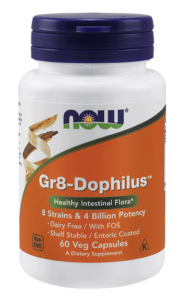 Note: It is a great idea to introduce healthy bacteria during and after a prolonged bout of GI upset. This might include things like Kombucha tea or kefir. You might also want to consider taking a probiotic supplement for 10 days or more. We recommend GR8 dophilus as it is loaded with 8 different strains of healthy bacteria to help get your gut back to normal quickly.
Note: It is a great idea to introduce healthy bacteria during and after a prolonged bout of GI upset. This might include things like Kombucha tea or kefir. You might also want to consider taking a probiotic supplement for 10 days or more. We recommend GR8 dophilus as it is loaded with 8 different strains of healthy bacteria to help get your gut back to normal quickly.
If you’re constipated:
Constipation can occur when not eating enough fiber-rich fruits and veggies, which stimulate digestion. This can lead to cramping, bloating, and pain of the GI system. Remember to first increase your fluid intake. Water, green tea, and black coffee can help to get things moving again. If your fluid intake is adequate then try these foods.
Best foods: Almonds, black beans, prunes, quinoa, flaxseed, broccoli, pears, and apples. A word of caution, do not increase your fiber intake by more than 20% as the increase in bulk can lead to an overload of the gut and further compound the problem.
Worst foods: Chocolate, dairy products, iron supplements, narcotics (pain medications), and some blood and anti-depression medications may worsen constipation.
Note: Try taking GR8 dophilus to improve the bacterial count in your gut that helps to breakdown food into more digestible parts. Magnesium citrate is a natural supplement that can also be used in the immediate term to get things moving smoothly.
Feeling nauseous:
Feeling queasy makes all foods sound unappealing, but the right ones can ease symptoms by calming stomach acids. Keep your food portion size small and try to eat frequently to help keep your blood sugar stable.
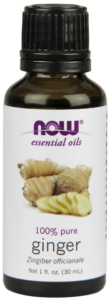 Best foods: Ginger or lemon tea, fresh or frozen lemon slices, and peppermint tea can be very helpful. You can add the essential oils of ginger, lemon, and/or peppermint to water to help aid the nausea as well.
Best foods: Ginger or lemon tea, fresh or frozen lemon slices, and peppermint tea can be very helpful. You can add the essential oils of ginger, lemon, and/or peppermint to water to help aid the nausea as well.
Worst foods: Greasy, spicy, or oily foods, caffeine, alcohol, and carbonated drinks can make nausea worse.
It hurts to swallow:
When you have a sore throat, several foods can coat your throat and soothe the pain.
Best foods: Combine peppermint tea (lukewarm, not hot)—which has analgesic and anesthetic effects—and honey, which is known for its wound-healing properties. Soft, creamy foods such as mashed sweet potatoes, yogurt/kefir, scrambled eggs, and bone broth are also soothing.
Worst foods: Avoid hot liquids and hard, scratchy foods such as potato chips, nuts, and granola. The acidic juices from raw fruits and vegetables, as well as orange juice, grape juice, and lemonade can also irritate a sore throat. These juices should also be avoided because of their high sugar content. Sugar feeds bacteria and viruses and therefore will make any illness worse.
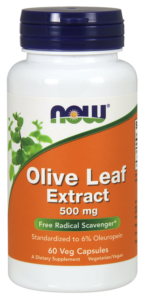 Note: Olive Leaf Extract is a powerful anti-viral, anti-bacterial supplement that is consistently helpful in reducing illness. The olive leaf extract nasal and throat sprays are fantastically helpful for post-nasal drip and throat pain. These sprays have effective bug-fighting capabilities that can directly target the bugs where they are living, thus making it difficult for the microbes to reproduce.
Note: Olive Leaf Extract is a powerful anti-viral, anti-bacterial supplement that is consistently helpful in reducing illness. The olive leaf extract nasal and throat sprays are fantastically helpful for post-nasal drip and throat pain. These sprays have effective bug-fighting capabilities that can directly target the bugs where they are living, thus making it difficult for the microbes to reproduce.
Your head hurts:
Dehydration is one of the leading causes of headaches and very common during any illness. Start with drinking some water or an herbal tea.
Best foods: Water and other fluids are your best bet. Refrain from any liquid with a lot of sugar or artificial sweeteners. If water is not going to do it for you try adding lemon, lime, cucumber, or berries to your water for soothing flavors.
Worst foods: Headache-triggering foods include artificial sweeteners, MSG (found in sauces and soy sauce), aged cheeses that contain tyramine, plus chocolate, red wine, hot dogs, deli meats, and dried fruit.
Congestion and earache:
Since congestion and earaches occur most often with upper respiratory infections, foods that clear up congestion can help.
Best foods: Clear fluids and chicken soup ease congestion by loosening up mucus in nasal passages. Omega-3s found in salmon and nuts decrease inflammation, and vitamin C found in dark leafy greens, berries, and citrus boost the immune system. Fresh pineapple contains bromelain which can thin mucus and allow for better breathing. Also, turmeric/curcumin is a powerful antioxidant spice. Besides taking this in supplement form, you can make a tea with it. Try Golden Milk: Place 2 cups of coconut or almond milk in a saucepan with 1 tsp dried turmeric, 1 tsp dried ginger, a dash of black pepper and honey to taste. Bring to a simmer, allow to sit for 10 minutes and serve warm.
Worst foods: Dairy can thicken phlegm and worsen congestion. Stay away from sugar, processed and packaged foods, which increase inflammation and lengthen the recovery process.
Red and itchy:
A rash could be a symptom of an allergy or food sensitivity. Keeping a good food diary is a great way to narrow down the culprits. Try increasing foods that can reduce inflammation, which is at the heart of the problem.
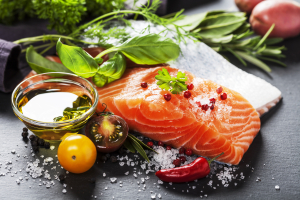 Best foods: Omega-3 containing foods such as fatty fish (salmon, sardines) and walnut and flaxseed oils, as well as foods high in protein are all helpful to reduce allergy symptoms.
Best foods: Omega-3 containing foods such as fatty fish (salmon, sardines) and walnut and flaxseed oils, as well as foods high in protein are all helpful to reduce allergy symptoms.
Worst foods: The most common food for allergies and food sensitivities are nuts, chocolate, shellfish, tomatoes, eggs, berries, soy, wheat, and milk. Wheat and milk are especially troublesome as they can greatly influence your systemic inflammation over time. Luckily, if you avoid processed foods you can easily eliminate dairy and wheat (gluten) from your dietary intake.
A runny nose:
When you have a cold, the worst symptom might be a nose that just won’t stop running. This often annoying symptom of a cold can be helped by a hot steamy shower, a neti pot, or by diffusing your favorite essential oil like Nature’s Shield or Lemon/Eucalyptus. Aside from these feel-good remedies, try making yourself a pot of tea.
Best foods: Try green or ginger tea. Both contain antioxidant and anti-inflammatory properties that may help clear up a cold faster than just waiting it out.
Worst foods: Spicy foods can cause an immediate runny nose (which then turns into congestion), as may alcohol.
Note: Try getting adjusted by your chiropractor or using acupuncture when you have a cold. Both have been shown to shorten the life of the common cold. Both can also improve the headache and general malaise associated with a cold. Many patients call us at the beginning of a cold and can testify to feeling better quickly thereafter.
But first…
The first 24 hours of any illness is key. For most ailments there are some consistent things I recommend putting into play very quickly. By doing these things you have a better chance to reduce the severity and length of most bugs trying to get you down.
- Avoid things that reduce your immune system: Sugar, stress, exercise, and dairy foods should all cease immediately.
- Add foods that activate your immune system: Bone broth, turmeric/curcumin, garlic, onion, and celery should find their way into your diet when you are sick.
- Supplement to boost your immune system: Olive Leaf Extract, N-acetyl cysteine (NAC), Curcumin, and L-glutamine all can keep your immune system running at its top level.
- Assist your immune system: Get proper rest and sleep. Pull away from work, social, and exercise routines to give your immune system enough energy to put up a fight.
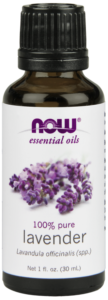 Improve sinus drainage for your immune system to function: Use a neti pot twice daily, diffuse helpful essential oils (Nature’s shield, Lemon/Eucalyptus, Lavender), take hot baths/showers, drink hot teas, and get to your chiropractor.
Improve sinus drainage for your immune system to function: Use a neti pot twice daily, diffuse helpful essential oils (Nature’s shield, Lemon/Eucalyptus, Lavender), take hot baths/showers, drink hot teas, and get to your chiropractor.
For other helpful tips, just stop in our Roanoke, Virginia chiropractic office and ask us! You can also visit our “Ask the Doctor” page to ask us for advice. We would love to help you become healthier than you’ve ever been!

Daryl C. Rich, D.C., C.S.C.S.





